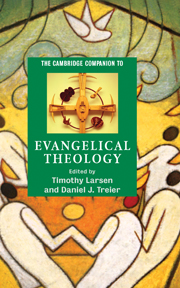Book contents
- Frontmatter
- 1 Defining and locating evangelicalism
- Part I: Evangelicals and Christian doctrine
- 2 The triune God of the gospel
- 3 Scripture and hermeneutics
- 4 Jesus Christ
- 5 The human person in the Christian story
- 6 Justification and atonement
- 7 The Holy Spirit
- 8 Conversion and sanctification
- 9 The church in evangelical theology and practice
- Part II: The contexts of evangelical theology
- Index
6 - Justification and atonement
from Part I: - Evangelicals and Christian doctrine
Published online by Cambridge University Press: 28 September 2007
- Frontmatter
- 1 Defining and locating evangelicalism
- Part I: Evangelicals and Christian doctrine
- 2 The triune God of the gospel
- 3 Scripture and hermeneutics
- 4 Jesus Christ
- 5 The human person in the Christian story
- 6 Justification and atonement
- 7 The Holy Spirit
- 8 Conversion and sanctification
- 9 The church in evangelical theology and practice
- Part II: The contexts of evangelical theology
- Index
Summary
What is “justification” and how is it related to atonement? Justification is being found just or righteous before God. The atonement is how Christ accomplishes our justification through his sacrifice on the cross. The following essay will examine biblical foundations of these doctrines, their historical genesis and controversies, and then in conclusion some pressing questions raised about them in contemporary theology.
BIBLICAL FOUNDATIONS
As Roger Olson rightly notes, for most contemporary evangelicals “justification by grace through faith alone” is the “soul of the Christian Gospel.” This is understood to be the heart of the Protestant Reformation, grounded in its emphasis on sola scriptura. Martin Luther's reading of Paul's letter to the Romans is the foundation for the doctrine of justification by faith alone, but Protestants claim Paul warrants this doctrine, not Luther. Martin Luther (1483-1546) was originally an Augustinian monk. He read the works of St. Augustine and found them preferable to the theologians of the Middle Ages, who were known as “the Schoolmen.” However, not even Augustine offered Luther a satisfactory account of how terms such as “law, sin, grace, faith, righteousness, flesh, spirit and the like” were to be understood. Luther thought the church of his day misunderstood these terms, largely because philosophical categories alien to the Bible led it astray. Luther wrote, “Augustine got nearer to the meaning of Paul than all the Schoolmen but he did not reach Paul. In the beginning I devoured Augustine, but when the door into Paul swung open and I knew what justification by faith really was, then it was out with him.” Luther turned from Augustine to Paul to discover how the righteousness of God overcomes our sin.
- Type
- Chapter
- Information
- The Cambridge Companion to Evangelical Theology , pp. 79 - 92Publisher: Cambridge University PressPrint publication year: 2007
- 3
- Cited by

